OCB-sponsored participants of IMBER ClimECO5 in August 2016.
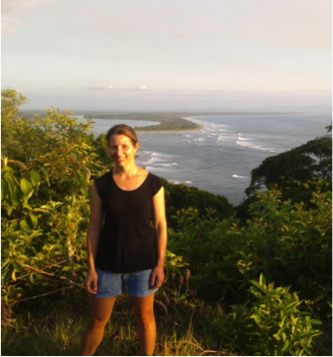 Tayler Clarke completed her MSc at the University of Costa Rica in 2013. Her master’s thesis focused on the spatial distribution and reproduction of shark and ray bycatch in shrimp trawl fisheries. Currently, she is a second year PhD student in William Cheung’s lab at the Institute for the Oceans and Fisheries, University of British Columbia. Tayler continues to study shrimp trawl fisheries in her dissertation, this time focusing on climate change impacts. She hopes to work with Costa Rican universities and the national fishery management institute to integrate her PhD thesis into current fisheries management initiatives.
Tayler Clarke completed her MSc at the University of Costa Rica in 2013. Her master’s thesis focused on the spatial distribution and reproduction of shark and ray bycatch in shrimp trawl fisheries. Currently, she is a second year PhD student in William Cheung’s lab at the Institute for the Oceans and Fisheries, University of British Columbia. Tayler continues to study shrimp trawl fisheries in her dissertation, this time focusing on climate change impacts. She hopes to work with Costa Rican universities and the national fishery management institute to integrate her PhD thesis into current fisheries management initiatives.
“I loved participating in the IMBER summer school because it gave me the opportunity to interact with so many motivated graduate students and early career researchers. The classes and workshops exposed us to interesting new tools and ideas. The best part was being able to collaborate on a research project with the instructors’ guidance. Lisa and the instructors created a very positive, exciting environment that stimulated learning and collaborations. I am very grateful for the opportunity to have participated in IMBER summer school 2016!”
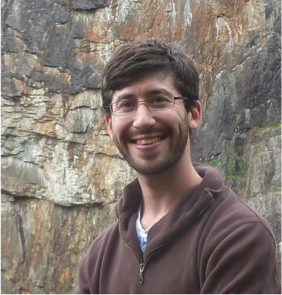 Daniel Kaufman is a PhD student in marine science at the Virginia Institute of Marine Science, College of William and Mary. He received his BS in physics from the University of Maryland, College Park. His current research examines phytoplankton dynamics and climate-induced impacts in the Ross Sea, Antarctica, using gliders and biogeochemical modeling. He also contributes to an investigation of effects of anthropogenic watershed use on the Chesapeake Bay using the Regional Ocean Modeling System.
Daniel Kaufman is a PhD student in marine science at the Virginia Institute of Marine Science, College of William and Mary. He received his BS in physics from the University of Maryland, College Park. His current research examines phytoplankton dynamics and climate-induced impacts in the Ross Sea, Antarctica, using gliders and biogeochemical modeling. He also contributes to an investigation of effects of anthropogenic watershed use on the Chesapeake Bay using the Regional Ocean Modeling System.
“The atmosphere in the course was both really positive and energizing throughout. The highlight for me was meeting, exchanging ideas, and having fun with participants from such a wide variety of academic and personal backgrounds. The practical exercises and group project gave me a chance to gain valuable practice with new modeling approaches under the supervision of topic experts. Lectures during ClimEco5 introduced me to new ideas and expanded on ideas with which I had previously only passing familiarity, and this all made it a wonderful learning experience over a broad range of topics.”
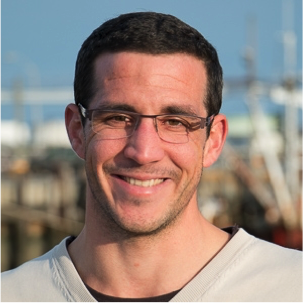 Arnault Le Bris was a postdoctoral research associate at the Gulf of Maine Research Institute (GMRI) when he attended the ClimEco5 summer school. Since then, Arnault has started a new research scientist position at the Centre for Fisheries Ecosystems Research at The Marine Institute of Memorial University of Newfoundland, Canada. During his postdoctoral research at GMRI, Arnault worked on understanding and forecasting the impacts of climate change and fishing on New England lobster fisheries. In his research, Arnault has paid special attention to the mechanisms underlying the responses in lobster life history traits to climate change.
Arnault Le Bris was a postdoctoral research associate at the Gulf of Maine Research Institute (GMRI) when he attended the ClimEco5 summer school. Since then, Arnault has started a new research scientist position at the Centre for Fisheries Ecosystems Research at The Marine Institute of Memorial University of Newfoundland, Canada. During his postdoctoral research at GMRI, Arnault worked on understanding and forecasting the impacts of climate change and fishing on New England lobster fisheries. In his research, Arnault has paid special attention to the mechanisms underlying the responses in lobster life history traits to climate change.
“The ClimEco5 summer school delivered a unique interdisciplinary approach to address the issues that oceans, and the human societies depending on oceans, are facing. I was impressed by the diversity and quality of the lectures, which married perfectly with the diversity of the participants. I especially appreciated that all lecturers stayed the entire course, which allowed for deeper interactions between participants and lecturers, and contributed to numerous fun movements that we shared…”
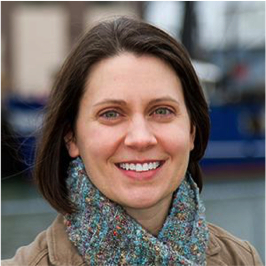 Kathy Mills is an associate research scientist at the Gulf of Maine Research Institute in Portland, Maine. She is a quantitative fisheries ecologist, and her work focuses on understanding how environmental variability and climate change affect fish populations, fisheries, and fishing communities. Her recent work focuses on climate vulnerability assessment and adaptation approaches in marine fisheries.
Kathy Mills is an associate research scientist at the Gulf of Maine Research Institute in Portland, Maine. She is a quantitative fisheries ecologist, and her work focuses on understanding how environmental variability and climate change affect fish populations, fisheries, and fishing communities. Her recent work focuses on climate vulnerability assessment and adaptation approaches in marine fisheries.
“IMBER’s ClimECO5 summer school was a great opportunity to gain an overview of tools and approaches that can be used to understand the ecological, social, and coupled social-ecological impacts of climate change on marine ecosystems. It was exciting to dig into these topics with lecturers who are international leaders in this field. It was also invigorating to meet so many students and early career scientists from across the world who are working on similar questions using a wide range of interesting approaches.”
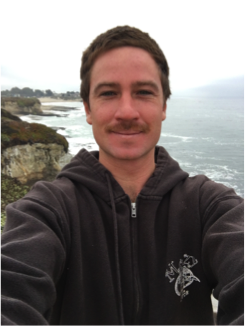 Mark Morales received his BS in Environmental Systems: Ecology, Behavior and Evolution at University of California San Diego. During his BS, Mark was involved with various research groups at the Scripps Institution of Oceanography where he studied coastal biological oceanography, Antarctic ecology and fisheries science. As a recipient of the NSF GRFP, Mark is now a 2nd year PhD student in Ecology and Evolutionary Biology at the University of California Santa Cruz. For his PhD, Mark is interested in teasing apart the relationships between interannual environmental variability and recruitment success of central California rockfish species. Mark is using state-of-the-art statistical and mathematical frameworks such as species distribution models, ocean circulation models, nutrient-phytoplankton-zooplankton models and individual-based movement and bioenergetics models to address his questions.
Mark Morales received his BS in Environmental Systems: Ecology, Behavior and Evolution at University of California San Diego. During his BS, Mark was involved with various research groups at the Scripps Institution of Oceanography where he studied coastal biological oceanography, Antarctic ecology and fisheries science. As a recipient of the NSF GRFP, Mark is now a 2nd year PhD student in Ecology and Evolutionary Biology at the University of California Santa Cruz. For his PhD, Mark is interested in teasing apart the relationships between interannual environmental variability and recruitment success of central California rockfish species. Mark is using state-of-the-art statistical and mathematical frameworks such as species distribution models, ocean circulation models, nutrient-phytoplankton-zooplankton models and individual-based movement and bioenergetics models to address his questions.
“The level of participant and instructor engagement during IMBER ClimEco5 exceeded my expectations. The amount of scientific and cultural diversity housed within the summer school was the most fascinating part to me. I have acquired many new collaborators, and more importantly friendships that will last throughout my career and beyond. The quality of instruction was terrific and I went home armed with many new tools under my belt that will surely allow me to tackle some of the most pressing questions in marine science. IMBER ClimEco5 is hands down the best event that I have attended as an early career scientist. Without the kind financial support from OCB, none of this would have been possible.”
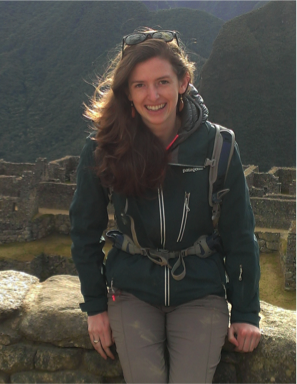 Ellen Willis-Norton is a PhD student in Ecology and Evolutionary Biology at the University of California, Santa Cruz. Her research seeks to understand how the California Current Ecosystem will respond to climate change. She is currently working with colleagues at NOAA to publish a climate vulnerability assessment for 65 commercially important west coast fisheries. The assessment will be used as a starting point for her research examining how west coast fish species’ habitat will shift with climate change and whether certain management tools can increase their resilience to a changing climate.
Ellen Willis-Norton is a PhD student in Ecology and Evolutionary Biology at the University of California, Santa Cruz. Her research seeks to understand how the California Current Ecosystem will respond to climate change. She is currently working with colleagues at NOAA to publish a climate vulnerability assessment for 65 commercially important west coast fisheries. The assessment will be used as a starting point for her research examining how west coast fish species’ habitat will shift with climate change and whether certain management tools can increase their resilience to a changing climate.
“The ClimEco5 summer school was truly an interdisciplinary experience led by renowned lecturers. The in-depth lectures allowed me to develop my species distribution modeling skills and experiment with new model approaches. Additionally, I learned about qualitative and agent-based modeling tools that I had never been exposed to before. The summer school also provided invaluable networking opportunities; I now am collaborating with PhD students and Post-Docs from around the world. I hope to maintain the relationships I made at the summer school throughout my career!”




